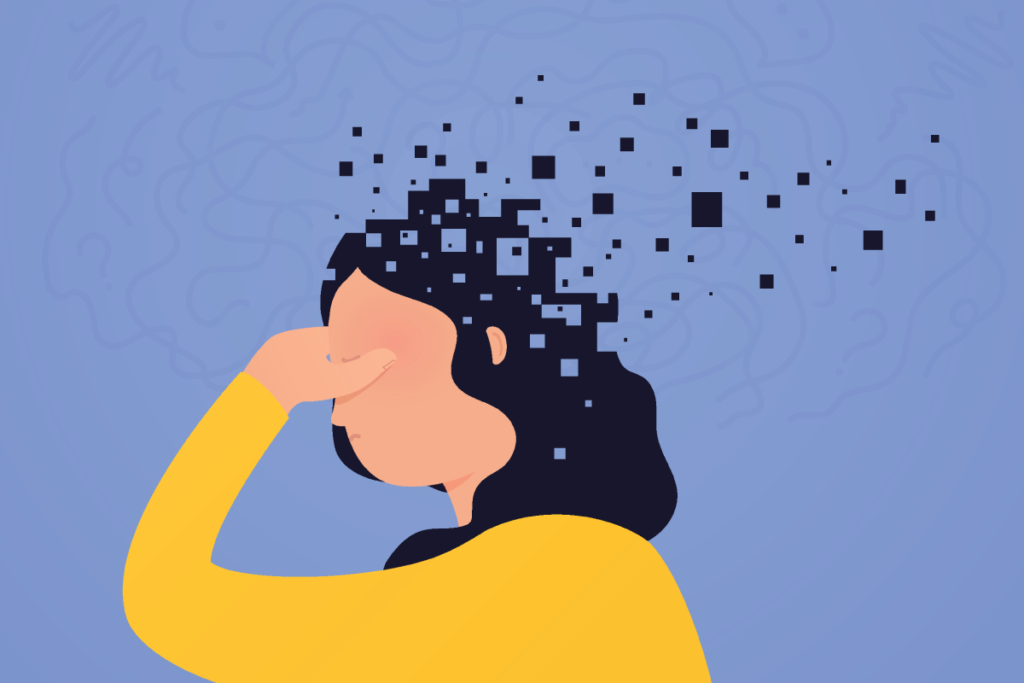Featured
Past Imperfect: Exploring the Challenges—and the Promise—of Memory’s Malleability

Sidebar: Analyzing Amnesia
Throughout human history, countless metaphors have emerged to encapsulate the foundational experience of recalling the past. As outlined in a 1980 paper on the subject by APS Past President Henry L. Roediger, III, these metaphors can be as far ranging as a subway map of interconnected experiences, Plato’s wax tablet, and “melodies on a piano” that gesture toward the way our memories can change over time. More recently, indie rock musician Andrew Bird’s 2012 song “Lazy Projector” characterized the mind as a “forgetting, embellishing, lying machine” that can cause two people to recall the same relationship completely differently.
Even when focusing solely on empirical findings, psychological scientists position their understanding of memory through metaphor as well, Roediger added, often through drawing parallels between mental and physical behaviors. Terms such as “recollection” and “open-mindedness” arise from this kind of thinking, as did Freud’s comparatively ornate conception of conscious and unconscious memory as a house with two rooms managed by a discerning doorkeeper who can repress certain thoughts from conscious awareness.
Regardless of the particular metaphor used, Roediger wrote, the way we talk about memory generally positions the mind as a physical space and the memories we “store” in it as physical objects that can be lost, found, or broken. Memory processes are also often equated with the most modern technology of the time, causing our understanding of memory to morph alongside the development of increasingly precise tools—from wax tablets, to projectors, to computers.
Although none of these metaphors offer a perfect analogy for how memory actually works, Roediger continued, they can nonetheless help laypeople and scientists alike to conceptualize complex phenomena in everyday terms.
Heightened awareness of memory’s malleability may have led to an overcorrection in favor of the idea that our memories simply cannot be trusted.
Recently, memory metaphors have been employed as a way of demonstrating the unreliability—or “malleability”—of our memories. Decades of evidence suggest that our memories can be altered in both subtle and extreme ways, said Nicholas B. Diamond (University of Pennsylvania) in an interview with the Observer, but heightened awareness of these findings may have led to an overcorrection in favor of the idea that our memories simply cannot be trusted.
“Just as the science of perceptual illusions should not necessarily be taken to call into question the veracity of what you’re seeing at every moment, the science of false memory should not be taken to entirely undermine the reliability of a person’s recollection without pointing to specific, evidence-based factors,” Diamond said.
An unreliable start
Beyond the everyday experience of forgetting names or what we had for breakfast, there is, of course, significant experimental evidence of our imperfect memories.
In one study, Shazia Akhtar (University of London) and colleagues found that nearly 40% of 6,313 participants claimed that the earliest memory they could recall was formed when they were 2 years old or even younger. This is highly improbable, given that humans generally struggle to recall experiences from this preverbal period of development, even when it comes to highly unique events such as the birth of a sibling, Akhtar and colleagues explained in a 2018 Psychological Science article.
Participants who reported that their first memory occurred between 2 and 5 years of age tended to mention more detailed events such as family holidays, starting school, or even dreams. Participants with improbably early memories, on the other hand, often reported impressions of experiences typical of very early childhood, such as being pushed in a stroller or feeling sad, without necessarily referring to a specific event.
These more impressionistic memories of typical early-childhood experiences may result from people grasping onto the image of an object or action from later experience, photographs, or stories about their early life, the researchers suggested.
“Such episodic-memory-like mental representations come, over time, to be recollectively experienced when they come to mind, and so for the individual, they quite simply are ‘memories,’ memories that their content indicates date to a particular time: infancy,” Akhtar and colleagues explained. “Indeed, in the constructive view of memory, all memories contain some degree of fiction.”
Visit the APS archive for much more on eyewitness memory and wrongful convictions. Featured content includes:
- 2021 supplemental issue of Psychological Science in the Public Interest by APS Fellows John T. Wixted, Gary L. Wells, Elizabeth F. Loftus, and Brandon L. Garrett
- April 2022 PSPI Live webinar with Judge Jed Rakoff and John T. Wixted (the webinar recording is also available on APS’s YouTube channel, under the PSPI Playlist).
- Interview with Wixted in a November 2021 episode of Under the Cortex, the APS podcast.
Research also indicates that the way we interpret our existing memories can be intentionally manipulated after the fact.
In a pair of 2019 studies in Clinical Psychological Science, Lawrence Patihis (University of Southern Mississippi) and colleagues asked 500 people to write about childhood memories of their mothers. Participants who responded to prompts about negative moments—in which their mother demonstrated an absence of love, warmth, and other supportive behaviors—reported fewer loving memories and current feelings of love for their mothers than those who responded to positive prompts. These self-reported effects lasted an average of 4 weeks but began to fade back to normal by 8 weeks after the experiment.
“Love for one’s parents has been a timeless and precious part of the human experience throughout history,” Patihis and colleagues wrote. “That memory of love is malleable is an uncomfortable but important finding.”
This malleability allows us to reconstruct memories in a way that may help people maintain a consistent life narrative, Akhtar and colleagues suggested in their Clinical Psychological Science article. Using impressionistic memories to extend this narrative into the early stages of our lives may even support a positive self-image and social interactions, the researchers added.
The ability to “make and remake” memory is also a huge part of how we learn, a phenomenon APS Fellow Lynn Nadel (University of Arizona) discussed in his 2018 Fred Kavli Keynote address at the 30th APS Annual Convention in San Francisco. This allows us to integrate new information with our existing knowledge—but each time a memory is reactivated, it is also at risk of being rewritten in a way that may not accurately reflect the past.
Memory on trial
In a 2002 study led by Kimberley A. Wade (Victoria University of Wellington), researchers were able to convince 10 out of 20 participants to agree that they had taken a fictional hot air balloon ride as a child using fake photographs and guided-imagery exercises. Far more seriously, as discussed by APS Fellow Michael P. Toglia (Cornell University) and Garrett L. Berman (Roger Williams University) in the September/October 2021 issue of the Observer, misidentification of suspects by eyewitnesses—particularly non-White suspects misidentified by White witnesses—has been shown to be one of the leading causes of known wrongful convictions for violent crimes in the United States.
One of the most straightforward ways to rule yourself out as a suspect in a criminal case is to provide investigators with a solid alibi—an explanation for where you were at the time of the crime, supported by evidence and eyewitness accounts. In a 2021 Psychological Science study of 51 adults, Elizabeth Laliberte (University of Melbourne) and colleagues put participants’ memory for “where” and “when” to the test using a GPS tracking app. A week later, participants self-reported their locations incorrectly 36% of the time despite being given four options to choose from, one of which was guaranteed to be correct.
The malleable nature of memory can also contribute to false confessions, wrote Julia Shaw (University of Bedfordshire) and Stephen Porter (University of British Columbia) in a 2015 Psychological Science article. Using leading interview techniques, including false evidence allegedly provided by a childhood caregiver, Shaw and Porter were able to convince 70% of 60 participants with no history of police contact to report believing that they had committed a serious theft or had assaulted someone when they were 11 to 14 years old. Participants were provided with a narrative of the fictional event alongside real memories of their childhood and were pressured to recall the experience over the course of three interview sessions.
“In the context of a highly suggestive interview, people can quite readily generate rich false memories of committing crime,” Shaw and Porter wrote. “The kind of research presented here is essential in the quest to help prevent memory-related miscarriages of justice.”
Trust, but verify
Even as the “memory wars” surrounding these and other possible memory errors play out in courtrooms and other venues worldwide, it can be difficult to determine the actual prevalence of misremembering under real-world conditions, Diamond told the Observer.
Diamond and colleagues explored that prevalence by analyzing 74 participants’ recollections of two verifiable events at Baycrest hospital in Ontario, Canada. The first group of 34 participants took part in a standardized mask-fitting procedure for hospital staff during the 2003 severe acute respiratory syndrome (SARS) outbreak. The remaining 40 participants experienced a staged tour of a small art exhibition on the hospital’s ground floor.
In both cases, participants were invited days to years later to share their memories of the event with a researcher who encouraged them to volunteer additional details using general statements such as, “Is there anything else you can tell me about this event?” The memories were recorded and scored based on whether each detail constituted a specific episodic memory and whether the researchers could objectively verify that the event had occurred as recalled.
Mask-fit participants, most of whom were interviewed years after the fact, recalled a total of 61 unique details about the event, with an average of 23 details reported per person. Tour participants, some of whom spoke with researchers just days later, recalled 209 unique details. Tour participants ages 19 to 35 recalled an average of 79 details, whereas participants ages 65 to 75 recalled an average of 52.
Despite the significant decline in the number of details recalled by participants who were older or whose interviews took place later, one finding was consistent across groups: The vast majority of verifiable details that participants freely reported in the interviews were accurate. In fact, the lowest accuracy of any group was 93%, on average, for older tour participants, and no participant in any group was found to be less than 70% accurate.
“Consistent with centuries of past work, participants in our study forgot a great deal of information, and they recalled fewer and fewer details with greater retention intervals (e.g., 2 years vs. 2 days) and in older age,” Diamond explained.
The accuracy of information that participants did recall was very high, however, suggesting that when people aren’t pressed for details in a leading manner, they’re likely to share only information they are confident they can remember.
“As we forget, we’re more likely to omit information than make it up,” Diamond summarized.
Unclouding the past
While many researchers continue to wrestle with the extent to which our memories can be relied on, others are exploring how this malleability can be harnessed to improve well-being. Conditions such as posttraumatic stress disorder (PTSD) and depression are both accompanied by memory impairments, explained Maryam Piltan (Tarbiat Modarres University) and colleagues in a 2021 Clinical Psychological Science article. PTSD is most commonly defined by the presence of intrusive memories related to a traumatic event, the researchers continued, but it has also been shown to cloud patients’ memories of events unrelated to that trauma.
Hierarchical theories of memory suggest that recollections of our past may be organized on two levels: At the top of the hierarchy are general memories about different categories of events, such as “going to the grocery store” or “birthday parties”; beneath these, we store specific memories of individual instances of these events, like “going to the grocery store this morning” or “my 31st birthday party.”
Analyzing Amnesia
Amnesia, the loss of some or all of one’s memories, has become so common in fiction, it’s basically a cliché. Although movies like The Bourne Identity and Total Recall can take creative license with the concept, the clinical diagnosis of amnesia should be far more standardized. Unfortunately, this consistency is sometimes lacking in practice, as Ivan Mangiulli (KU Leuven) and colleagues revealed in a 2021 article in Clinical Psychological Science.
Mangiulli and colleagues reviewed the cases of 128 people who were described as having “dissociative amnesia” in English-language journals between 2000 and 2020. This term generally refers to memory loss that appears to occur without any specific physical cause, such as a head injury, possibly following a traumatic event. Some patients were evaluated using neuroimaging and other proven diagnostic measures. Others were described as having dissociative amnesia on the basis of self-reports, even if they did not meet all of the prerequisites for the condition laid out in the Diagnostic and Statistical Manual of Mental Disorders.
“Dissociative amnesia, as sketched in these case studies, appeared to be a rather elastic and openly defined construct that described various types of memory loss,” Mangiulli and colleagues wrote. “Without proper examination that rules out differential diagnosis and alternative explanations, the diagnostic label of dissociative amnesia as currently known may be deceiving.”
In separate research, McKenna M. Garland (University of Tulsa) and colleagues zeroed in on anterograde amnesia, a difficulty or inability to store new information, through a Psychological Science study of seven patients with damage to their medial temporal lobes.
The patients and their caregivers reported on the patients’ personality five times over the span of a year following their injury. Personality assessments were made using the Big Five Inventory, which scores participants on neuroticism, extraversion, openness, agreeableness, and conscientiousness.
Patients and caregivers were found to have significantly different perceptions of patients’ current personalities—but not of patients’ personalities before their brain injury.
“The amnesic patients maintained a keen sense of who they were before their brain injury but were stuck in the past, in that they failed to form an accurate perception of who they are now,” Garland and colleagues wrote. “We interpret our findings to indicate that the ability to form new declarative memories is not required for maintaining a stable sense of self but may be important for updating one’s sense of self over time.”
According to this theory, attempting not to think about a traumatic memory may hinder individuals’ access not only to that memory in particular but to an entire store of specific memories, said Piltan and colleagues.
“Attempts to avoid the trauma memory can overgeneralize to all autobiographical memories such that individuals begin to experience difficulty in retrieving specific memories of other single-incident events from their personal past,” Piltan and colleagues wrote. The clarity of individuals’ autobiographical memories is highly predictive of long-term PTSD severity, and improving this process may also lead to better outcomes for patients, added coauthor Caitlin Hitchcock in an interview with the Observer.
The researchers demonstrated the relationship among memory inflexibility, lack of specificity, and PTSD through a study of 43 people who had experienced a serious car accident in Tehran, Iran. After being admitted to Sina Hospital, half of these participants had symptoms severe enough for a clinical diagnosis of PTSD.
In addition to being assessed for symptoms of PTSD, participants completed the Alternating Instructions Autobiographical Memory Test (AMT-AI). In this test, individuals are asked to retrieve specific or general memories from their past in response to positive, negative, or neutral cue words.
Participants who were diagnosed with PTSD had more incorrect responses when asked to retrieve specific memories than those who did not have clinically significant levels of PTSD despite also experiencing a car accident. The PTSD group also had more difficulty alternating between recall of specific and general memories during mixed trials.
Participants without PTSD performed similarly to a community sample of participants who had not experienced an accident on measures of memory specificity, but they had worse memory flexibility.
“Memories from our past play a key role in how we think about ourselves and the world around us, so improving the ability to access autobiographical memories of different levels of detail and emotional valence may help to promote balanced and flexible views about the self and world,” Hitchcock said.
In a related study, Piltan, Hitchcock, and colleagues, including lead author Ali Reza Moradi (Kharazmi University), explored this theory by investigating how a memory-flexibility intervention called MemFlex might be used to improve outcomes for people with PTSD. In this proof-of-concept study, the researchers worked with a different group of 43 people in Iran who had survived car accidents and had PTSD. All participants completed the AMT-AI and were assessed for symptoms of PTSD before being split into two groups: one that received the MemFlex intervention and another that served as a waitlist control group.
Although both groups received ongoing therapy and medication to manage their PTSD, the MemFlex group also received a paper workbook of eight autobiographical-memory exercises. Similar to the AMT-AI, these exercises involved journaling about positive and neutral memories that were general or specific in nature. At this point, a researcher met with the participants in person to explain how memory inflexibility relates to PTSD, help them practice the exercises, and encourage them to complete two exercise sessions per week over a period of 4 weeks.
After 4 weeks, the researchers collected the workbooks and participants in both groups completed the AMT-AI and PTSD symptom measures again. They were also tested at a follow-up appointment approximately 3 months later.
Participants in the MemFlex group performed better on the AMT-AI. More importantly, 70% had a clinically meaningful reduction in PTSD symptoms, compared to just 40% of those in the control condition. After completing their follow-up appointment, control participants were also given the opportunity to complete the MemFlex intervention.
“Training someone to flexibly move between specific events and generalized representations of the past may help to constrain overly generalized, negative beliefs,” the researchers wrote.
MemFlex has a number of advantages over other commonly used PTSD interventions, Hitchcock added. The intervention is low cost, can be delivered digitally or as a workbook to people without internet access, and is still effective when provided by someone without any training in psychology. Additionally, it allows patients to confront the symptoms of PTSD without having to revisit traumatic memories.
“MemFlex focuses on improving access to positive memories from your own life, and individuals who have completed the intervention have told us that they like that the focus is purely on increasing the positive,” Hitchcock said.
As her work and that of other researchers demonstrates, it’s certainly reasonable to question the reliability of our memories. Traumatic experiences and the fog of time alike can cloud the particulars of events, as well as how we felt about those events when they were happening. But the same malleability that allows challenging experiences to cast a shadow over our past can also be harnessed to build a brighter future.
Related Research
-

Memory
Learn about the vast stores of memory research that psychological scientists have amassed in recent years.
-

Mindfulness and Meditation
Researchers explore how practices associated with mindfulness and meditation can affect decision-making and other cognitive processes.
-

Grief and Trauma
Psychological scientists are leading the way in addressing the mental health issues resulting from traumatic events.
This article was initially published in the print edition of the May/June 2022 Observer under the title, “Past Imperfect.”
Feedback on this article? Email [email protected] or scroll down to comment.
References
Akhtar, S., Justice, L. V., Morrison, C. M., & Conway, M. A. (2018). Fictional first memories. Psychological Science, 29(10), 1612–1619. https://doi.org/10.1177/0956797618778831
Diamond, N. B., Armson, M. J., & Levine, B. (2020). The truth is out there: Accuracy in recall of verifiable real-world events. Psychological Science, 31(12), 1544–1556. https://doi.org/10.1177/0956797620954812
Garland, M. M., Vaidya, J. G., Tranel, D., Watson, D., & Feinstein, J. S. (2021). Who are you? The study of personality in patients with anterograde amnesia. Psychological Science, 32(10), 1649–1661. https://doi.org/10.1177/09567976211007463
Laliberte, E., Yim, H., Stone, B., & Dennis, S. J. (2021). The fallacy of an airtight alibi: Understanding human memory for “where” using experience sampling. Psychological Science, 32(6), 944–951. https://doi.org/10.1177/0956797620980752
Mangiulli, I., Otgaar, H., Jelicic, M., & Merckelbach, H. (2021). A critical review of case studies on dissociative amnesia. Clinical Psychological Science, 10(2), 191–211. https://doi.org/10.1177/21677026211018194
Moradi, A. R., Piltan, M., Choobin, M. H., Azadfallah, P., Watson, P., Dalgleish, T., & Hitchcock, C. (2021). Proof of concept for the autobiographical memory flexibility (MemFlex) intervention for posttraumatic stress disorder. Clinical Psychological Science, 9(4), 686–698. https://doi.org/10.1177/2167702620982576
Patihis, L., Cruz, C. S., & Herrera, M. E. (2019). Changing current appraisals of mothers leads to changes in childhood memories of love toward mothers. Clinical Psychological Science, 7(5), 1125–1143. https://doi.org/10.1177/2167702619842468
Piltan, M., Moradi, A. R., Choobin, M. H., Azadfallah, P., Eskandari, S., & Hitchcock, C. (2021). Impaired autobiographical memory flexibility in Iranian trauma survivors with posttraumatic stress disorder. Clinical Psychological Science, 9(2), 294–301. https://doi.org/10.1177/2167702620953637
Roediger, H. L. (1980). Memory metaphors in cognitive psychology. Memory & Cognition, 8(3), 231–246. https://doi.org/10.3758/BF03197611
Shaw, J., & Porter, S. (2015). Constructing rich false memories of committing crime. Psychological Science, 26(3), 291–301. https://doi.org/10.1177/0956797614562862
Wade, K. A., Garry, M., Read, J. D., & Lindsay, D. S. (2002). A picture is worth a thousand lies: Using false photographs to create false childhood memories. Psychonomic Bulletin & Review, 9(3), 597–603. https://doi.org/10.3758/BF03196318





APS regularly opens certain online articles for discussion on our website. Effective February 2021, you must be a logged-in APS member to post comments. By posting a comment, you agree to our Community Guidelines and the display of your profile information, including your name and affiliation. Any opinions, findings, conclusions, or recommendations present in article comments are those of the writers and do not necessarily reflect the views of APS or the article’s author. For more information, please see our Community Guidelines.
Please login with your APS account to comment.